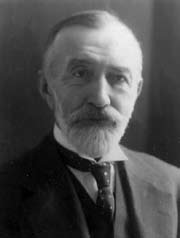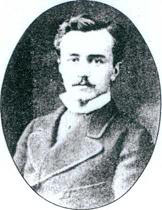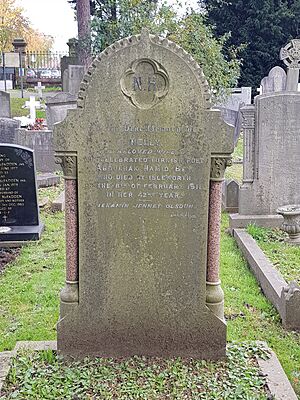Abdülhak Hâmid Tarhan facts for kids
Quick facts for kids
Abdülhak Hâmid Tarhan
|
|
|---|---|
 |
|
| Born |
Abdülhak Hâmid
January 2, 1852 |
| Died | April 12, 1937 (aged 85) |
| Nationality | Turkish |
| Occupation | Playwright, poet |
Abdülhak Hâmid Tarhan (born Abdülhak Hâmid; January 2, 1852 – April 12, 1937) was an important Ottoman writer from the early 1900s. He was a talented playwright (someone who writes plays) and poet (someone who writes poems). People in Turkish literature called him "Şair-i Azam," which means "The Grand Poet," and "Dahi-i Azam," meaning "The Grand Genius." He was a key figure in the Turkish Romantic period, a time when writers focused on feelings and imagination.
Contents
Who Was Abdülhak Hâmid Tarhan?
His Early Life and Education
Abdülhak Hâmid Tarhan was born on January 2, 1852, in Bebek, a part of Constantinople. His grandfather, Abdulhak Molla, was a poet and doctor for the Sultan, who was the ruler of the Ottoman Empire. His father, Hayrullah Efendi, was a historian and an ambassador (a diplomat who represents his country in another). His mother, Münteha Hanım, was from the Circassian group.
Abdülhak Hâmid had private teachers while he was in secondary school. In 1863, he went to Paris, France, with his brother, because his father worked there. He studied in Paris for about a year and a half. After returning to Istanbul, he went to a French school and worked in an office that translated documents to improve his French. A year later, he joined his father, who was working at the Ottoman Embassy in Tehran, Iran. There, he learned Persian and studied Persian and Arabic poetry for over a year. After his father passed away in 1867, he came back to Istanbul and started working for the government.
His Career as a Writer and Diplomat
After meeting famous writers, Abdülhak Hâmid wrote his first prose (writing that is not poetry) called Macera-yı Aşk (Love Affair). It was about his memories from Tehran. In 1871, he got married to Fatma.
He started working for the government in foreign affairs, which means dealing with other countries. In 1876, he was sent to the Ottoman Embassy in Paris. An embassy is like an office for a country's representatives in another country. In Paris, he learned a lot about French literature.
A Play Causes Trouble
In 1878, he faced a problem when his play Nesteren was published in Paris. The play was about a rebellion against a ruler. The ruler of Turkey at that time, Sultan Abdul Hamid II, was very unhappy about it. Because of this, Abdülhak Hâmid was fired from his government job.
Travels and Personal Life
He was later appointed to different places: Poti, Georgia, in 1881; Volos, Greece, in 1882; and Bombay, India, in 1883. In 1885, his wife Fatma became ill, so the family left India. On their way back to Istanbul, Fatma passed away in Beirut, which was then part of the Ottoman Empire. She was buried there. Her death inspired him to write a very popular poem called Makber (The Grave).
Because of another work he wrote called "Zeynep", he was temporarily removed from his job at the Embassy in London. He was only allowed to go back to his post after he promised not to write anymore. He then married a British woman named Nelly. After working for two years in The Hague in the Netherlands, he was sent back to London. In 1900, Abdülhak Hâmid returned to Turkey because his wife Nelly was ill. In 1906, he was sent to the Embassy in Brussels, Belgium.
Later Years and Politics
In 1908, he became a member of the Turkish Senate, which is a part of the government. His wife Nelly died in 1911. Later, he married a Belgian woman named Lucienne.
Abdülhak Hâmid had to return to Turkey after a change in the government during the Balkan Wars. After World War I, he spent a short time in Vienna, Austria. He came back home when the Turkish Republic was officially created in 1923. He continued to be involved in politics. In 1928, he was elected as a deputy (a representative) for Istanbul in the Turkish Grand National Assembly, which is like the country's parliament. He held this job until he passed away.
Abdülhak Hâmid Tarhan died on April 12, 1937. He was buried with a national funeral in the Zincirlikuyu Cemetery in Istanbul.
His Important Writings
Abdülhak Hâmid was influenced by the Tanzimat period (a time of reforms in the Ottoman Empire) and by other writers like Namık Kemal. He was also inspired by French writing. His wife's death was a very important event in his life, and he wrote many pieces about her, including Makber. He is remembered for bringing Western influences into Turkish literature and is considered one of the greatest Turkish romantic writers.
Poetry
- Sahra (The Desert, 1879)
- Makber (The Grave, 1885)
- Ölü (The Corpse, 1885)
- Hacle (1886)
- Bunlar Odur (These are Her, 1885)
- Divaneliklerim Yahut Belde (My Madness or the Town, 1885)
- Bir Sefirenin Hasbihali (Chat With an Ambassadress, 1886)
- Bala'dan Bir Ses (A Voice from Bala, 1912)
- Validem (My Mother, 1913)
- İlham-ı Vatan (Inspiration of the Motherland, 1916)
- Tayflar Geçidi (The Parade of Spectrums, 1917)
- Ruhlar (The Spirits, 1922)
- Garam (My Passion, 1923)
Plays
- Macera-yı Aşk (Love Affair, prose, 1873; in verse, 1910)
- Sabr-u Sebat (Perseverance in Patience, 1875, performed in Istanbul in 1961)
- İçli Kız (The Oversensitive Girl, 1875)
- Duhter-i Hindu (The Girl of India, 1876)
- Nazife (Nazife, 1876, with Abdüllahü's-Sağir, 1917)
- Nesteren (Dog Rose, 1878)
- Tarık Yahut Endülüs'ün Fethi (Tarık Or The Conquest Of Spain, 1879, performed in Istanbul in 1962)
- Tezer Yahut Abdurrahman-ı Salis (Tezer or Abdurrahman III., 1880)
- Eşber (Eşber, 1880)
- Zeynep (Zeynep, 1908)
- İlhan (İlhan, 1913)
- Liberte (Freedom, 1913)
- Finten (Finten, 1887)
- İbn-i Musa Yahut Zadülcemal (İbn-i Musa or Zadülcemal, 1917)
- Sardanapal (Sardanapal, 1917)
- Abdüllahi's Sağir (Little Abdullah, 1917)
- Yadigar-ı Harb (The Souvenir of The War, 1917)
- Hakan (1935)
- Cünun-ı Aşk (Insanity Of Love, not published, 1917)
- Kanuni'nin Vicdan Azabı (Remorse of Suleyman The Magnificent, 1937, not published)
İnci Enginün translated his plays into modern Turkish, published in seven books between 1998 and 2002.
Other Works
- Mektuplar (Letters, collected by Süleyman Nazif, two books, 1916)
- Hatırat (Memories, published in newspapers İkdam and Vakit, 1924–25)
- Yusuf Mardin wrote a novel about the time Abdülhak Hâmid spent in London. It was called Abdulhak Hamit'in Londrası (Abdulhak Hamit's London).
See Also
- List of contemporary Turkish poets
 | Valerie Thomas |
 | Frederick McKinley Jones |
 | George Edward Alcorn Jr. |
 | Thomas Mensah |



